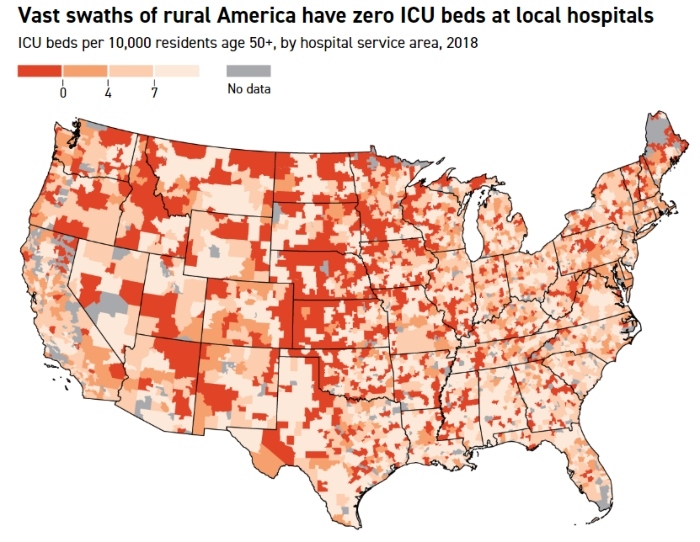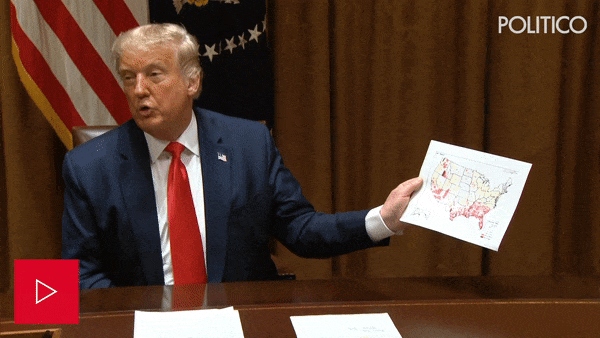
|
With help from Myah Ward
AMERICAN HOLIDAY — Americans treasure their chance to trade in sweltering heat for breezy beaches every August. This year, the regular rhythms of the traditional summer are colliding headfirst into peak Covid season: About 1.9 million of the country’s 4.7 million infections occurred in the month of July, according to data from Johns Hopkins University.
Travel is down broadly this summer, the first decline in more than a decade, according to AAA . But that data point isn’t slowing the pandemic: Many Americans are still traveling, and the coronavirus has become an unfortunate part of their baggage.
An interstate rest stop in Kansas has been a hub of cases. Out-of-state travelers have been blamed for virus surges in Myrtle Beach, S.C. A dozen cases in the Philadelphia suburbs were traced to Jersey Shore house parties.
America’s travel bug, heightened after months of being cooped up, undermines the competing desire to be done with the virus. Over the weekend, White House coronavirus task force coordinator Deborah Birx warned the country is in a “new phase” with hotspots around the country not just in crowded urban centers, but also in rural areas.
“The situation on the ground is much worse today,” said Marta Wosińska, deputy director at the Duke-Margolis Center for Health Policy. “What is dangerous about this: If people get into the holiday mindset and let their guard down, that’s a concerning combination.”
Some popular summer holiday destination spots have already clamped down on out-of-state visitors and partiers. Maine and Rhode Island are among the states that require proof of a negative Covid test or a 14-day quarantine. Short-term rentals have been shut down in Miami. Beaches in Chicago are mostly closed.
New Jersey’s Democratic Gov. Phil Murphy today placed new restrictions on indoor venues, capping capacity at the lesser of 25 percent or 25 people, New Jersey health care reporter Sam Sutton emailed your host today. Murphy attributed a spike in new cases to young revelers who’ve packed beach houses and party rentals. Jackson Township, the site of one such event that attracted roughly 700 partiers, is now exploring banning short-term rentals in an attempt to ward off travelers carrying the virus.
“Unfortunately, however, the actions of a few knuckleheads leave us no other course. We have to go back and tighten these restrictions once again."
NEW JERSEY GOV. PHIL MURPHY
|
But the measures haven’t completely kept Covid out. Without a coordinated national response, states are still struggling to contain the virus within their borders. Officials at a Bar Harbor, Maine hospital blamed out of towners for spreading the virus in their town, saying they didn’t learn about the positive test results that travelers took in their home state because of delayed test results.
And the patchwork of state and local policies will lead to Covid spikes in places with less restrictive policies, said Marynia Kolak, assistant director for health informatics at the University of Chicago’s Center for Spatial Data Science. She said that hotspots have already cropped up in border areas between states with different policies, like along the Arizona and California border.
Now, with cabin fever setting in, she said holiday revelers will opt to travel to places where bars and restaurants and beaches are open or that don’t have strict quarantine requirements. Midwesterners are flocking to one Lake Michigan beach as others remain closed.
People cross state lines to pay less for cigarettes or alcohol, said Kolak. It’s no different with Covid.
“Areas that have laxer policies right now might get the brunt of infections in a few weeks,” she said.
Welcome to POLITICO Nightly: Coronavirus Special Edition. Wow: This obituary of a Texas man who died from Covid written by his wife. Reach out rrayasam@politico.com or on Twitter at @renurayasam.
A message from PhRMA:
America’s biopharmaceutical companies are sharing their knowledge and resources more than ever before to speed up the development of new medicines to fight COVID-19. They’re working with doctors and hospitals on over 1,100 clinical trials. Because science is how we get back to normal. More.
| FIRST IN NIGHTLY |
MORE MONEY, FEWER PROBLEMS — The last time Washington debated how much stimulus to inject into a moribund economy, the mantra inside the White House was: The more, the better. Former President Barack Obama agreed to go big, and in his first month in office, he signed an unprecedented $800 billion economic recovery bill — twice as large as a public request by hundreds of liberal economists, four times as large as Obama’s own campaign plan, writes senior magazine staff writer Michael Grunwald. In retrospect, most economists agree, more would have been better.
Now Washington is considering a fifth package that could add at least another trillion dollars to the tab. But with unemployment still in double digits, expanded benefits to laid-off workers expiring at the worst possible time, and the virus still on the rampage, economists are warning that far more stimulus will be needed to lift the country out of the abyss.
Nevertheless, stimulus fatigue seems to be spreading on Capitol Hill, especially among Republicans, and negotiations over the next package seem to be going nowhere fast. There’s a tension between massive relief bills and President Donald Trump’s message that the recovery is already rocking — and Republican senators like Rand Paul of Kentucky, Ron Johnson of Wisconsin and Ben Sasse of Nebraska are starting to express ideological discomfort with Big Government spending bills at a time of record-shattering deficits.
“How long can we just keep throwing money at the problem?” asked one Republican staffer on the Senate side. He then answered his own question: “Not forever.”
HAPPENING 8/4 @ 10 a.m. EDT - ECONOMIC RECOVERY IN THE MIDST OF A PANDEMIC: The coronavirus has caused a record-setting economic decline and tens millions of Americans have lost their jobs. Join POLITICO chief economic correspondent Ben White for an interview with LinkedIn chief economist Karin Kimbrough to discuss prospects for economic growth, the uptick in jobless claims after weeks of decline and how extending unemployment benefits could help in the economic recovery. REGISTER HERE.

Medical workers showcase designs during a virtual fashion show of personal protective equipment in Yogyakarta, Indonesia. | Getty Images
| ON THE ECONOMY |
END RUN AROUND CONGRESS — The chairman of the Senate Banking Committee is calling on federal agencies to extend the eviction moratorium and looser lending rules that Congress established in March, as lawmakers and the Trump administration struggle to reach a deal on the next round of aid, financial services reporter Zachary Warmbrodt writes.
In a letter to housing and bank regulators that was obtained by POLITICO, Senate Banking Chair Mike Crapo (R-Idaho) urged the officials to use their existing authority to continue eviction protections and less burdensome lending rules — in effect doing an end run around Congress.
"Although there are already early, encouraging signs that the U.S. economy is beginning to heal, federal financial regulators must remain diligent, and continue to provide relief in light of a pandemic and economic conditions that continue to evolve," he said in the letter sent Friday. The letter has not been publicly released.
| FROM THE HEALTH DESK |
PREZ V. DOCS — Trump slammed Birx today after the public health official said the pandemic was “extraordinarily widespread.”
Trump’s attack comes shortly after top White House officials admonished House Speaker Nancy Pelosi for undermining trust in Birx.
“So Crazy Nancy Pelosi said horrible things about Dr. Deborah Birx, going after her because she was too positive on the very good job we are doing on combatting the China Virus, including Vaccines & Therapeutics,” Trump wrote on Twitter. “In order to counter Nancy, Deborah took the bait & hit us. Pathetic!”
Trump did shift his tone during his daily coronavirus news briefing at the White House later today, saying that Birx is “a person I have a lot of respect for.“ He also said Pelosi was “very nasty” toward Birx.
At the briefing Trump again split with scientists on his coronavirus task force by endorsing the use of hydroxychloroquine. When asked why he still supports the drug despite pushback from task force members Anthony Fauci and Adm. Brett Giroir, Trump took the opportunity to distance himself from Fauci. “I don't agree with Fauci on everything,” Trump said, citing Fauci’s earlier resistance to mask-wearing and banning travelers from China. “It doesn't mean he's a bad person, because he's not. He's a good person, I like him. But we disagree on things.”
WHERE THERE ARE ZERO ICU BEDS — More than half of all rural low-income communities in the U.S. have zero ICU beds, forcing local hospitals to rely on transfers to wealthier communities for their sickest coronavirus patients, according to a new study.
The findings, published in Health Affairs, underscore the economic disparities shaping the nation’s coronavirus response, especially as the virus shifts from wealthier coastal metros to rural communities in the Southeast and West that have historically struggled with access to care, health care reporter Tucker Doherty writes.

Tucker Doherty | POLITICO
| AROUND THE NATION |
‘A HORRIBLE POSITION’ — States are preparing to pull thousands of National Guard troops off the front lines of coronavirus relief efforts with federal funding set to expire later this month and no response from the White House on governors' pleas to extend the deployments for the rest of the year, Alice Miranda Ollstein and Lara Seligman write.
State officials and lawmakers have been pressing the White House and Defense Department for months for an extension of the troops' federal status, maintaining that as the virus surges across dozens of states, they cannot support the Guard members who have been running virus testing sites, assisting with contact tracing, building field hospitals, sanitizing nursing homes and stocking food banks.
Federal support for the Guard response to the public health crisis is set to end on Aug. 21. That means states will have had to pull Guard personnel from their duties by Aug. 7 to give them two weeks to quarantine before returning to their home communities. While some states, including Washington and Arizona, have vowed to fully fund the troops' missions with state dollars if federal support disappears, other states cannot afford to do so.
Today, the National Governors Association released a statement slamming the administration for “unnecessary delays” that are creating “significant challenges for states and territories, which are amplified in the middle of a crisis.”
“Every day counts," said one Defense official, who requested anonymity to speak about ongoing discussions. "We are getting very close to when all the guardsmen and women have to start shutting down."
| COVID-2020 |
THREE MONTHS TO GO — Time may have lost all meaning for most of us. But when it comes to the presidential election, the clock is still ticking. In the latest episode of POLITICO Dispatch, chief Washington correspondent Ryan Lizza brings us inside of Trump's and Biden's campaigns as they enter the final stretch — under circumstances unlike any election in U.S. history.
POLITICO'S "FUTURE PULSE" - THE COLLISION OF HEALTH CARE AND TECHNOLOGY : As the United States remains stuck in a screening crisis, a worldwide competition has been launched to find the top Covid-19 rapid testing solutions. The contest aims to find a system with a painless sample and quick turnaround for results. When will a breakthrough come? From Congress and the White House, to state legislatures and Silicon Valley, Future Pulse spotlights the politics, policies and technologies driving long-term change on the most personal issue for voters: Their health. SUBSCRIBE NOW.
| NIGHTLY NUMBER |
83 percent
The proportion of New York City bars and restaurants that were unable to pay their full rent for July, according to a survey released today by the NYC Hospitality Alliance. Thirty-seven percent of these establishments paid no rent at all, as restaurants and bars, which were shut down except for takeout for months, have continued to struggle since outdoor dining started on June 22.
|
| PARTING WORDS |
TESTING GOES RANDOM AT 1600 — As Trump continues to downplay the need for increased Covid-19 testing across the country, White House officials were told today they will now be subjected to random testing for the virus.
According to an email sent to executive branch employees, which POLITICO obtained, the new policy will require “random mandatory Covid-19 testing” for officials working inside the White House complex. Limited exceptions are available to aides who have spent the last 30 days working remotely or are on previously approved leave, White House reporter Gabby Orr writes.
It was not immediately clear whether there would be consequences for aides who decline to be tested for the virus or fail to show up when summoned to the White House Medical Unit.
“As part of our ongoing efforts to protect the health and safety of the entire White House Complex, randomized testing of Executive Office of the President staff, which has been ongoing for several months, will become mandatory rather than voluntary,” a White House spokesperson said in a statement to POLITICO. “Failure to report to testing will be considered a refusal to test,” the email stated.
A message from PhRMA:
America’s biopharmaceutical companies are sharing their knowledge and resources more than ever before to speed up the development of new medicines to fight COVID-19. They’re working with doctors and hospitals on over 1,100 clinical trials.
And there’s no slowing down. America’s biopharmaceutical companies will continue working day and night until they beat coronavirus. Because science is how we get back to normal.
See how biopharmaceutical companies are working together to get people what they need during this pandemic.
And there’s no slowing down. America’s biopharmaceutical companies will continue working day and night until they beat coronavirus. Because science is how we get back to normal.
See how biopharmaceutical companies are working together to get people what they need during this pandemic.
Did someone forward this email to you? Sign up here.
Follow us on Twitter
Renuka Rayasam @renurayasam
|
FOLLOW US
|






 he recovery has been very strong,” Donald Trump
he recovery has been very strong,” Donald Trump 







 baby
baby 